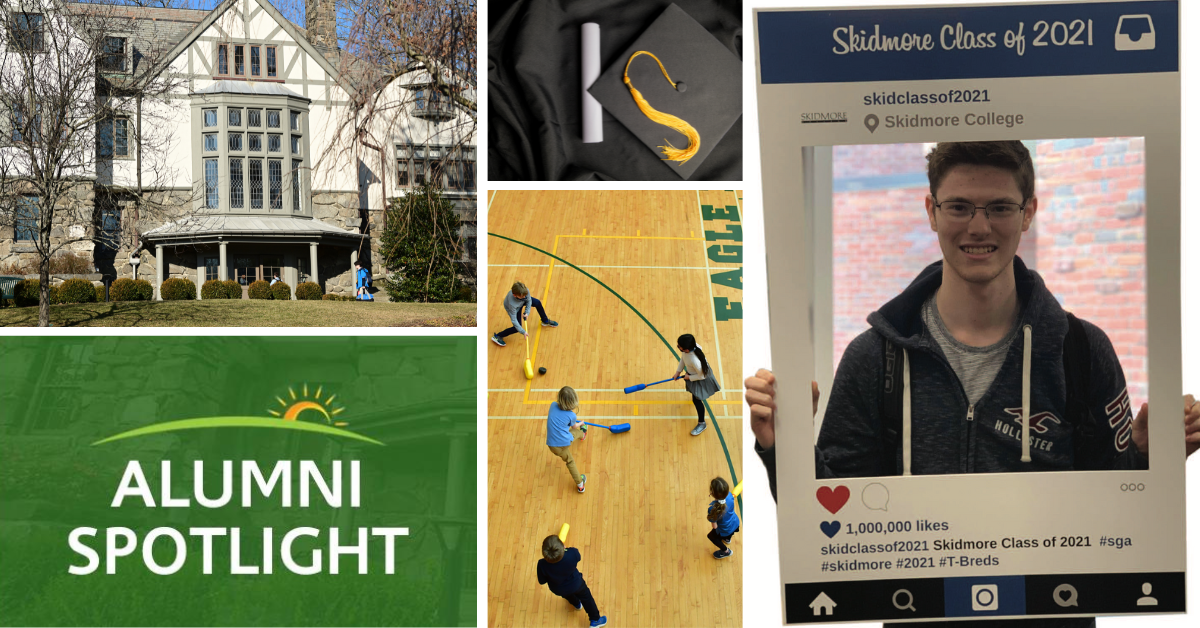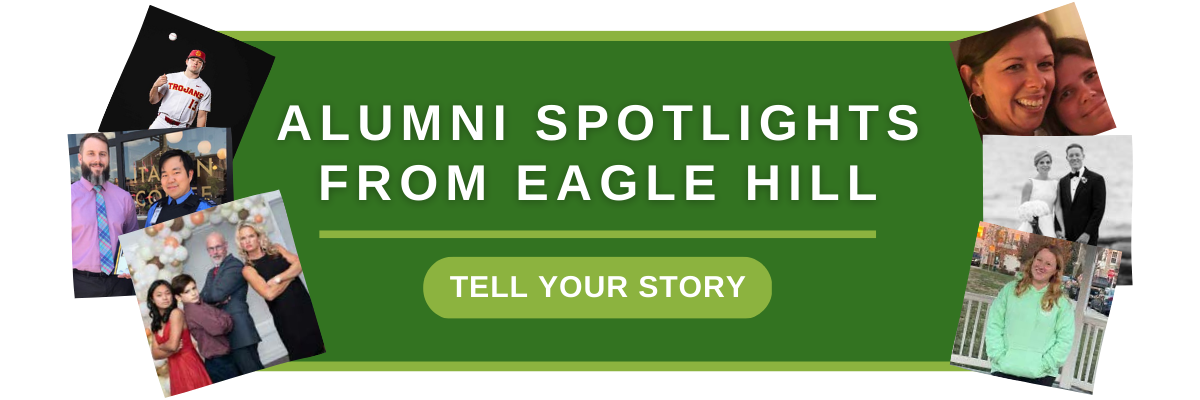Ben Canter, Eagle Hill class of 2013, is a graduate of Skidmore College with a Major in Psychology. During his time at college, he worked as a research assistant at the new Jewish Home Research Institute on Aging, where he’s conducting research on COVID-19 in nursing homes – studying the survivability, institutional barriers, and rehabilitation psychology related to COVID-19. Ben plans to attend Boston University to get his Doctorate in Occupational Therapy and Rehabilitation Sciences.
What brought you to Eagle Hill?
I got kicked out of my fourth-grade book club in my public elementary school. I didn’t do anything crazy; I just didn’t do the readings. But I didn’t do the work because I had difficulties with reading comprehension and a really bad working memory—even if I could do the reading, I wouldn’t have remembered it!
My teacher didn’t understand what it meant to have a disability—I had a traumatic brain injury as a child—and instead of encouraging me to do my best, she kicked me out of the book club. There were plenty of other things I struggled with such as general executive functioning issues and slow cognitive processing that indicated I needed a change, but my dad has always said that the book club incident was the last straw.
What did you learn at Eagle Hill that helped you manage your learning difference?
Eagle Hill provided me with the tools to navigate all kinds of academic situations, but I would say self-advocacy is by far the greatest asset that I gained by attending Eagle Hill. The ability to advocate for oneself is monumental not just in school, but in life. As a kid, when I got nervous and didn’t know what to do or how to do something (which was often), I didn’t know how to ask for help.
I am successful today only because Eagle Hill taught me to know when I need to solicit help from others, and how to ask for it. When you have difficulties learning—or really doing anything—there is no skill more valuable than knowing who and how to ask for help.
Beyond academics, what made Eagle Hill different from other schools?
I made the sports teams. In all seriousness, in retrospect, I appreciate the physical activity requirement Eagle Hill has. I wasn’t and still am not super athletic, and it’s hard to want to get exercise as a kid when you aren’t able to play sports.
The fact that someone as uncoordinated as myself can feel comfortable playing soccer, Ultimate Frisbee, and even flag football, as I did, is a testament to the supportive and accepting community EHS fosters. Also, as a psychology major and future occupational therapist, I’d be remiss not to mention the physical and mental benefits that exercise has on all individuals no matter one’s level of athleticism.
Tell us about your educational journey after EHS. After four years at Eagle Hill, I returned to my public school district for high school.
After graduating high school in 2017, I applied and was accepted to Skidmore College, where I’m now a senior majoring in psychology. This summer, I will start at Boston University’s Sargent College to pursue an OTD/PhD dual degree in Occupational Therapy and Rehabilitation Sciences.
Any words of advice for current students?
Be confident and keep your goals in mind. Believe you can do anything you put your mind and time towards. Nobody can stop you from trying, so try till you succeed. When I returned to public school again, I was overwhelmed for a few weeks until I got my bearings. Then I worked harder than ever to show my parents and myself that I could excel there.
Once I knew I wanted to go to Skidmore, and again when I knew I wanted to go to Boston University, I spent hours making sure my application was as good as possible. And I got in!
For parents, I’d say believe your child can do anything they set their mind to. Parental/ guardian support is so important. If you had asked my parents if 10-year-old me who just got kicked out of book club would one day go on to get his doctorate, I don’t know if they could tell you they would have predicted it—they were just hoping I’d make it through the rest of the fourth grade at that point!
Once they started to believe I could overcome anything, so did I. And that made all the difference.
Tell us more about your research experience at Skidmore.
During my sophomore year, I enrolled in Bridges to Skidmore, an integrative dance course in which Skidmore College students dance alongside adults with intellectual and developmental disabilities (IDD) twice a week. In the class, each student is assigned one to four dancers with IDD to choreograph and perform a dance together.
My professor and I used Wii Balance Boards to measure the balance of those with IDD before and after the classes, and the results showed that their balance improved! The following year, we co-wrote and published an article about the program’s impact on people with Down Syndrome in the International Journal of Exercise Science.
Tell us more about your work at the New Jewish Home Research Institute during the pandemic.
The New Jewish Home is a non-profit organization of skilled nursing facilities in the Westchester/New York City areas, and one of the only non-profit senior organizations in the country that consists of both clinical (nursing home/rehabilitation) and an established research institute. Collaborating with researchers from The New Jewish Home, NYU, and Mt. Sinai Icahn School of Medicine, I am a co-author on a series of studies where we explore topics such as the epidemiology of and therapeutic recovery from COVID-19 in the geriatric population.
Two of my favorite studies that we are doing are one on advanced directives during COVID-19 and another on the relationships between dementia and depression and COVID-19 rehabilitation outcomes. I will be presenting the findings of these two studies at the American Medical Director’s Association/Post-Acute and Long-Term Care conference and at the American Geriatrics Society conference in March and May 2021, respectively.
What have you learned as a student and a researcher during COVID-19?
So much—I am so lucky to be working with so many smart and generous people who serve as my professors, research collaborators, and mentors. Most importantly, I’ve learned how to be resilient, look on the bright side, and make the best of a bad situation. Originally, for the summer of 2020, I was hoping to do a paid internship as a rehab aide in a stroke rehabilitation center. But when they cut the program at the last minute due to COVID-19, my plans were dashed.
I decided that I couldn’t control COVID-19 (other than by masking up and staying distanced), but that didn’t mean I needed to sit around all day, so I emailed the Director of Research at The New Jewish Home and asked if they might have something for me to do. Looking back, I choose to see the summer program cancellation as a blessing in disguise—it allowed me to get the position I have now, learning from wonderful researchers and clinicians all the while contributing to society in a positive way.



